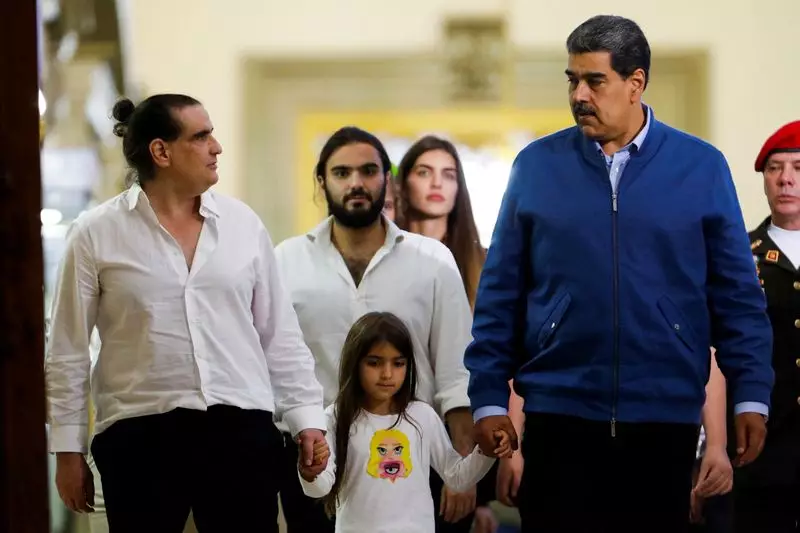Venezuela’s recent release of 30 U.S. and domestic prisoners, including businessman Alex Saab, in exchange for the freedom of a key ally of President Nicolas Maduro, has presented an opportunity for Maduro to strengthen his political position ahead of next year’s elections. Saab, who had been accused by U.S. prosecutors of embezzling $350 million from Venezuela through a bribery scheme involving Venezuelan government officials, had been held in federal jail in Miami since October 2021. His triumphant return to Caracas, where he was greeted by Maduro’s wife and received at the presidential palace by Maduro himself, sends a message that Maduro is willing to go to great lengths to defend his allies and maintain domestic support. According to Luis Vicente Leon, director of Caracas consultancy Datanalisis, this move by Maduro demonstrates his commitment to his party members and willingness to exhaust resources for their sake.
When Saab was arrested in 2020, he had been designated as a diplomat by Maduro to negotiate fuel and humanitarian aid shipments from Iran. Upon his return to Caracas, Saab expressed gratitude to the government for standing by him, affirming that Maduro’s administration would never give in. The release of Saab and the subsequent warm welcome from Maduro and his wife serve as a symbolic gesture to showcase Maduro’s unwavering commitment to his allies and to reinforce the image of his administration as one that prioritizes loyalty and support.
The White House had been pressuring Caracas to fulfill its side of an agreement, in which the United States provided relief from sanctions in exchange for Maduro’s commitment to hold free elections in 2024 and release prisoners believed to be held unfairly in Venezuelan jails. Maduro claims that the recent prisoner release is a partial compliance with the accord and a step toward improved diplomatic relations with the United States. Additionally, the government anticipates a boost in revenue from the relief of sanctions, with a projected 27% increase in income from the state-run oil company PDVSA. This newfound financial stability is likely to enable Maduro to increase social spending ahead of the 2024 election, further solidifying his position.
Despite Maduro’s assertion that the prisoner swap is a positive step towards diplomatic progress and adherence to the election agreement, critics argue that it will instead embolden Maduro and weaken Washington’s position. Marshall Billingslea, a former assistant secretary of the U.S. Treasury under President Donald Trump, stated on social media that Saab’s release undermines U.S. credibility in the fight against corruption, particularly in Latin America. He further claims that the release sends a detrimental signal to partner nations that had cooperated with the United States, believing that Saab would face justice. According to Billingslea, the swap is a significant blow to the Venezuelan opposition.
Amidst the controversy surrounding the prisoner release, U.S. President Joe Biden defended his decision, emphasizing the tough choice that had to be made. According to an anonymous U.S. official, President Biden had to offer something actively sought by the Venezuelan counterparts to facilitate the exchange. Biden acknowledged that Maduro has thus far upheld his end of the deal but cautioned that there is still a long road ahead.
Although some known opposition figures have been released or are expected to have their arrest orders withdrawn, it remains uncertain whether Maduro’s compliance with the election agreement extends beyond the prisoner exchange. Analysts argue that more progress is needed, such as the rescinding of public office bans against opposition members, including Maria Corina Machado, the announcement of an election date, and other essential guarantees. Oswaldo Ramirez of Caracas’ OCR Consultores emphasized the imperative of assessing whether the prisoner release is solely an exchange or if it signifies a genuine path towards free and fair elections.
Venezuela’s prisoner release has provided President Maduro with an opportunity to solidify his political strength ahead of the upcoming elections. By demonstrating unwavering support for his allies and fulfilling part of the agreement with the United States, Maduro aims to boost domestic support while potentially increasing social spending. However, critics argue that the swap undermines U.S. credibility and emboldens Maduro. The extent of Maduro’s compliance with the election agreement remains uncertain, warranting further scrutiny of whether this release is merely a prisoner exchange or a catalyst for progress towards free and fair elections.

